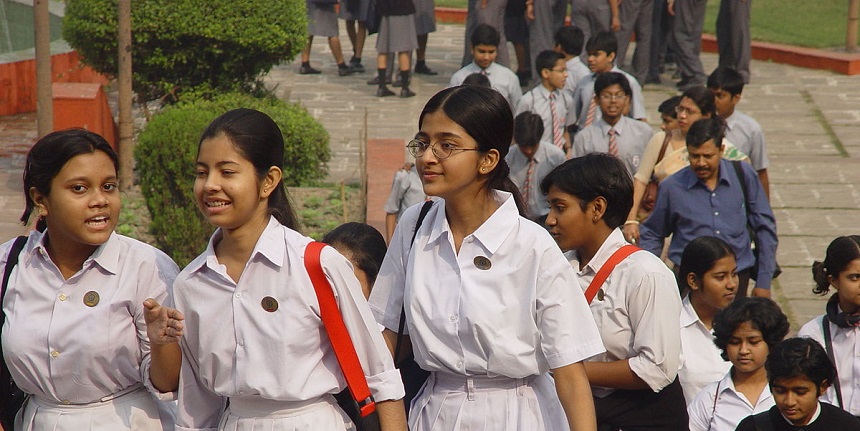CBSE Board Exams 2024: Class 12 physical education syllabus has 10 units
Vagisha Kaushik | November 29, 2023 | 01:05 PM IST | 3 mins read
CBSE Class 12 physics education syllabus 2023-24 is available at cbseacademic.nic.in. Check unit-wise topics.
CBSE 12 Class Free Mock Test
Boost your exam preparation with our CBSE 12 Class Free Mock Test, designed as per the latest exam pattern.
Attempt Now
NEW DELHI: The Central Board of Secondary Education (CBSE) Class 12 physical education syllabus 2023-24 has 10 units. CBSE Class 12 board exams 2024 will begin from February 16. The detailed syllabus of physical education Class 12 CBSE 2023-24 is available on the official website, cbseacademic.nic.in.
CBSE 2024 Class 12 Physical Education Exam live updates
CBSE Class 12th 2026 QP's: Physical Education | Physics
CBSE Class 12th 2026 Answer Key: Physics
CBSE Class 12: Free Mock Test | Formula Sheet: Maths | Physics | Chemistry
CBSE Class 12 (All Subjects): PYQ's | Question Bank | Practice Questions | Sample Papers
The board will release CBSE Class 12 date sheet 2024 soon at cbse.gov.in. The physical education paper will include a theory exam of 70 marks and internal assessment of 30 marks.
Board exam 2024 date sheet live updates
The unit-wise weightage of Class 12 physical education exam is as follows:
Name of unit | Weightage |
Management of sporting events | 5 + 4 |
Children and women in sports | 7 |
Yoga as preventive measure for lifestyle disease | 6 + 1 |
Physical education and sports for CWSN | 4 + 4 |
Sports and nutrition | 7 |
Test and measurement in sports | 8 |
Physiology and injuries in sport | 4 + 4 |
Biomechanics and sports | 10 |
Psychology and sports | 7 |
Training in sports | 9 |
CBSE 12th Board Exam 2024: Physical education syllabus
The unit-wise physical education syllabus of Class 12 CBSE 2-23-24 is as follows:
Unit 1
- Functions of sports events management (planning, organising, staffing, directing and controlling)
- Various committees and their responsibilities (pre, during and post)
- Fixtures and their Procedures – knockout (bye and seeding) and league (staircase, cyclic, tabular method) and combination tournaments
- Intramural and extramural tournaments – meaning, objectives and its significance
- Community sports programme (sports day, health run, run for fun, run for specific cause and run for unity)
Unit 2
- Exercise guidelines of WHO for different age groups.
- Common postural deformities-knock knees, flat foot, round shoulders, lordosis, kyphosis, scoliosis, and bow legs and their respective corrective measures.
- Women’s participation in sports – physical, psychological, and social benefits
- Special consideration (menarche and menstrual dysfunction)
- Female athlete triad (osteoporosis, amenorrhea, eating disorders.
Unit 3
Obesity, diabetes, asthma, hypertension, back pain and arthritis
Unit 4
- Organizations promoting Disability Sports (Special Olympics; Paralympics; Deaflympics)
- Concept of Classification and Divisioning in Sports
- Concept of inclusion in sports, its need, and implementation
- Advantages of physical activities for children with special needs
- Strategies to make physical activities assessable for children with special needs
Unit 5
- Concept of balanced diet and nutrition
- Macro and Micro Nutrients: Food sources & functions
- Nutritive & NonNutritive Components of Diet
- Eating for weight control – a healthy weight, the pitfalls of dieting, food intolerance, and food myths
Unit 6
- Fitness Test – SAI Khelo India Fitness Test in school
- Measurement of Cardio-Vascular Fitness – Harvard Step Test
- Computing Basal Metabolic Rate (BMR)
- Rikli & Jones - Senior Citizen Fitness Test
- Johnsen – Methney Test of Motor Educability
Unit 7
- Physiological factors determining components of physical fitness
- Effect of exercise on the muscular system
- Effect of exercise on the cardiorespiratory system
- Physiological changes due to aging
- Sports injuries
Unit 8
- Newton’s law of motion and its application in sports
- Types of levers and their application in sports
- Equilibrium – dynamic and static and centre of gravity and its application in sports
- Friction and sports
- Projectile in sports
Unit 9
- Personality; its definition and types (jung classification and big five theory)
- Motivation, its type and techniques
- Exercise adherence: reasons, benefits and strategies for enhancing it
- Meaning, concept and types of aggressions in sports
- Psychological attributes in sports – self-esteem, mental imagery, self-talk, goal setting
Unit 10
- Concept of talent identification and talent development in sports
- Introduction to sports training cycle – micro, meso, macro cycle
- Types and methods to develop – strength, endurance, and speed.
- Types and methods to develop – flexibility and coordinative ability.
- Circuit Training - Introduction and its importance
Follow us for the latest education news on colleges and universities, admission, courses, exams, research, education policies, study abroad and more..
To get in touch, write to us at news@careers360.com.